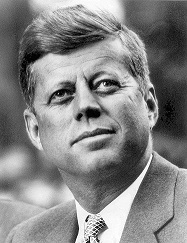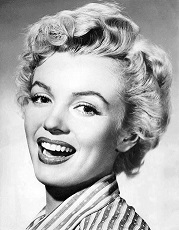1.1. Obituaries
A number of popular people died during the 1960s, but two of these deaths certainly shocked the world: the assassination of President John Fitzgerald Kennedy, and the death of actress Marilyn Monroe.
 Image in Wikimedia Commons under Public Domain |
 Image in Wikimedia Commons under Public Domain |
Conocimiento previo
 Image in Wikimedia Commons under Public Domain |
President John F. Kennedy was assassinated on November 22, 1963 at 12:30 p.m. while riding in a motorcade in Dallas during a campaign visit. Kennedy's motorcade was turning past the Texas School Book Depository at Dealey Plaza with crowds lining the streets—when shots rang out. The driver of the president's Lincoln limousine, with its top off, raced to nearby Parkland Memorial Hospital, but after being shot in the neck and head, Kennedy was pronounced dead at 1 p.m. He was 46 years old. A generation of Americans would forever remember where they were when they heard about the president's assassination, as it would have a profound political and cultural impact on the nation.
By 2:15 p.m., Lee Harvey Oswald, a new employee at the Book Depository, was arrested for JFK's assassination, as well as for the fatal 1:15 p.m. shooting of Dallas patrolman J.D. Tippit. Two days later, on Nov. 24, Oswald would be murdered by local nightclub owner and police informant Jack Ruby at point-blank range and on live TV.
Source: https://www.history.com/topics/us-presidents/jfk-assassination
Pregunta de Elección Múltiple
Actividad desplegable

Read a brief biography of Marilyn Monroe and fill in each gap with one word.

What do you think after all this information? What really happened to the President? What really happened to Marilyn Monroe?
Talk to members of your family. Do they remember when this happened?
What was your country like then? How did people take it?